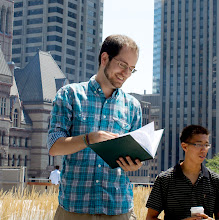‘Clearing a Path’ to the future
Zoe McKnight, Imprint staff
With a new term in full swing comes the possibility of new ideas and their fruition, and the imperative to make changes on campus and at home.
At least this was the idea put forth by the special panel hosted by Clearing a Path, a University of Waterloo Sustainability Project working group, on Tuesday September 18 in the Student Life Centre.
The panel convened to discuss the ways in which the UW community can — and must — address today’s environmental challenges by increasing sustainability on campus.
Representatives from the faculty of environmental studies, student advocates and Feds Vice President Internal Darcy Higgins spoke of the ability and responsibility of universities to lead by example in contributing to sustainability in the face of what the many environmental crises that are occuring.
Environmental Studies Associate Dean of Undergraduate Studies Mark Seasons referred to these crises as “deep, deep and irreversible trouble [...] global warming, water quantity and quality, air quality, resource depletion generally.”
Seasons argues that the privileges of campus life also bring obligations to enhance quality of life and sustainability. He also notes that while individual impacts do add up, political and administrative resources are needed to increase awareness and action.
Seasons pointed to UW’s aggressive recycling program, the on-campus farmers’ market, the ecological restoration of K-W’s industrial sites, as well as the rehabilitation of Laurel Creek, the U-Pass initiative and retrofitting buildings for energy savings as on- and off-campus examples of how the UW community has reduced its ecological footprint. And yet more programs are in the works for the university, pending administrative funding and approval, such as the proposed sustainability office.
Individual efforts targeting students must be coupled with efforts at the institutional level to support environmental and social justice projects, Tegan Renner, former co-ordinator of UWSP notes. Whereas WatGreen once employed a full-time staff member to act as liaison between staff, faculty and students regarding environmental issues and waste management, the program was dismantled without a staff replacement.
Opposition from top-level administration is based on the assumption that the proposed sustainability office will be too bureaucratic in nature, and therefore not “get things done,” said Higgins. Feds believes that UW can be the number one Canadian university in terms of low energy consumption and sustainability by supporting a sustainability office.
By reducing waste and energy use and increasing recycling, UW has already saved millions of dollars spent on waste management, Higgins said. This figure was echoed by ES Prof Greg Michalenko, who also encouraged students to push for an environmental commitment from top administration — not “a stodgy one.”
The discussion following the panel members’ speeches, though brief, did elicit some food for thought regarding how students can get involved. With students under academic deadlines and pressures, and facing so many volunteer opportunities, panel speakers emphasized the need to focus on one issue at a time and then work to convince administration of the urgency of environmental issues. “Make it fun” was the message of Justin Williams, Progressive Action Network facilitator, and combine “the need to be there” with the desire to have fun in the process.
Michalenko has witnessed “a robust sense of accomplishment and learning in all dimensions” in his exposure to green campus initiatives at American universities and emphasized the potential for UW campus sustainability to build bridges to the greater community while being educationally rewarding. He singled out the “continuous devotion of WPIRG ” and criticized the top administration for lagging behind the transition from “greening the campus” to sustainable universities, and the moral accountability to show that universities can transform themselves with new and dynamic ideas, using UBC and American universities as examples. The overarching message of the panel was the recognition of the urgency of campus sustainability and individual contributions coupled with an increased institutional leadership from UW.
Panel speaker and Dean of Arts Ken Coates stressed the sense of urgency required to make real changes while congratulating the UW community for advances already made. Bringing a staff perspective to the discussion, Coates noted that universities do have the ability to “get people on board” and proposed an assessment of students, professors and institutions in an environmental sense, not just academic.
While it is perhaps easier to hide environmental scars in this part of the country than in the Canadian North with its melting ice caps and changing wildlife migration patterns, Coates said the need to mobilize here is very real, with pressure coming from both the bottom and the top levels of community and campus.
Clearing a Path data suggests that the University of Toronto and the University of British Columbia both have sustainability offices employing several full time staff and enjoying $3 million in annual savings from water and energy consumption. A similar office at UW has the support from both Feds and the St. Jerome’s Student Union.
Labels: campus sustainability, Clearing a Path


0 Comments:
Post a Comment
Subscribe to Post Comments [Atom]
<< Home